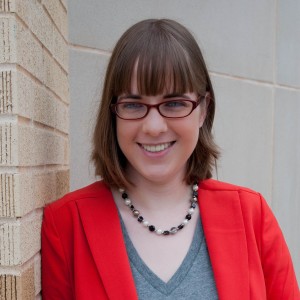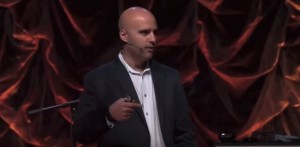I graduated college three years ago, having received a bachelor’s degree, a diagnosis of generalized anxiety disorder, a couple rounds of counseling, and some initial practice at stress management. Now, as a slightly more mature yet still meandering 20-something, I am excitedly and anxiously returning to school for a master’s degree — far away from home, no less. During this season of transitions for so many young people, I am reminding my mind of the unique stresses — and unique resources — that exist for students with reminders like this:

© 2012 CollegeDegrees360, Flickr | CC-BY-SA | via Wylio
1. Don’t leave your coping strategies at home. Identify maybe two to three coping strategies that have worked for you already — strategies you may have practiced over the summer — and keep them going as much as possible as you start school. Continuing some of your routines can be an absolute anchor for the soul. For me, this might look like prayer in the morning, deep breaths in the afternoon when my day is getting overwhelming, and a practice of gratitude around bedtime. I’d like to include going for a run, but realistically I have a love/hate relationship with exercise (which tends toward more “hate” than “love”)! For you, this can and should look like whatever simple, manageable practices work for you.
2. Investigate options for mental health care even before you arrive on campus. Check the resources provided by your school’s counseling center, health center and dean’s office. Sometimes schools also have student-run organizations like Active Minds and TWLOHA UChapters. If you think on-campus resources may not be the best fit for you, try asking for referrals and perusing Psychology Today’s therapist directory (which also includes listings of psychiatrists, support groups, and treatment facilities).
3. Don’t hide. When I feel anxious, all I want to do is curl up in bed in the fetal position — especially if I’m in a new place where I’m not sure who to reach out to for help. Curling up in bed is all right sometimes, but don’t let that be your only response to anxiety. Balance out that hour in isolation with an hour in counseling. Call up a friend. If you live in a dorm, knock on your resident assistant’s door. I promise there are good, good people around you willing to help, even if you don’t yet know who they are.
4. Try not to give in to “stress pressure.” This is like peer pressure, but it’s the particular pressure that can happen in school settings which pressures students to act stressed. Stress pressure suggests that when someone asks “Hey, how are you?” it’s somehow “cool” to say “I’m tired” or “I’m busy.” It’s somehow cool to pull all-nighters, chug coffee or energy drinks, and compare how many assignments you have due this week. But here’s what I’m reminding my anxious mind: It’s 100 percent cool to sleep, sip tea or water, and do your school work to the best of your ability without comparing it to others.
5. Practice self-acceptance. This might mean acceptance of getting an occasional B or C or F on a test. This might mean acceptance of (and even asking for) an extension on an assignment; professors will often outline policies for “grace days” on their course syllabi and review said policies on the first day of class, so pay attention to this and don’t be ashamed to use it. Above all, this means acceptance of who you are — the strong, smart, capable yet not-capable-of-everything human that you are.
I wonder: What would you put on this list? If you are a student (or work with students), what do you need to remind your anxious mind? Give yourself these reminders early and often, giving yourself grace now and throughout the school year.
This post originally appeared on themighty.com.
 Julia Powers is Blog Developer at EA Resources. A writer and seminary student at Duke Divinity School, Julia enjoys contributing an emerging adult voice to EA Resources and blogging at her own site www.juliapowersblog.com.
Julia Powers is Blog Developer at EA Resources. A writer and seminary student at Duke Divinity School, Julia enjoys contributing an emerging adult voice to EA Resources and blogging at her own site www.juliapowersblog.com.






 I save the least important subject of the site for last. You will always have a food budget, and eating right costs good money. In terms of its toll on health and wellness, cheap food is rarely worth the price. That said, you can eat well and save money as a student if you forego the more common options presented to you. Let’s dive into some of the food options and plans distinct to the college experience.
I save the least important subject of the site for last. You will always have a food budget, and eating right costs good money. In terms of its toll on health and wellness, cheap food is rarely worth the price. That said, you can eat well and save money as a student if you forego the more common options presented to you. Let’s dive into some of the food options and plans distinct to the college experience. At the developmental margins by definition, the in-betweeness of young adults is a huge part of why congregations are so flummoxed about them. Churches have long served children, youth, parents, empty-nesters, and elders. But emerging adults are a special kind of moving target, no longer youth but not quite adults.
At the developmental margins by definition, the in-betweeness of young adults is a huge part of why congregations are so flummoxed about them. Churches have long served children, youth, parents, empty-nesters, and elders. But emerging adults are a special kind of moving target, no longer youth but not quite adults.
 1. A survey of 1,184 of them found that during the previous three months, 80 percent had engaged in at least one of the following drunkorexic behaviors. While they do mention research, I would like to know more about this research. The behaviors listed in which 80% are participating could be mild or more severe. For example, the third behavior could refer to cutting back on calories simply because you know you will be drinking. I know many people who do this regularly, but it is not at an unhealthy level.
1. A survey of 1,184 of them found that during the previous three months, 80 percent had engaged in at least one of the following drunkorexic behaviors. While they do mention research, I would like to know more about this research. The behaviors listed in which 80% are participating could be mild or more severe. For example, the third behavior could refer to cutting back on calories simply because you know you will be drinking. I know many people who do this regularly, but it is not at an unhealthy level.




 Skye is ordained in the Christian & Missionary Alliance, a Protestant denomination established in 1887. He earned a Masters of Divinity degree in 2001 from Trinity Evangelical Divinity School in Deerfield, Illinois.
Skye is ordained in the Christian & Missionary Alliance, a Protestant denomination established in 1887. He earned a Masters of Divinity degree in 2001 from Trinity Evangelical Divinity School in Deerfield, Illinois.
 In the video, Micah did an excellent job portraying Millennials in their regular array of stereotypical descriptors. Micah also did a great job, I believe, of portraying the response of many churches to Millennials. Older generations often poke fun, lament, and avoid emerging adults rather than listen, learn, and serve.
In the video, Micah did an excellent job portraying Millennials in their regular array of stereotypical descriptors. Micah also did a great job, I believe, of portraying the response of many churches to Millennials. Older generations often poke fun, lament, and avoid emerging adults rather than listen, learn, and serve. 